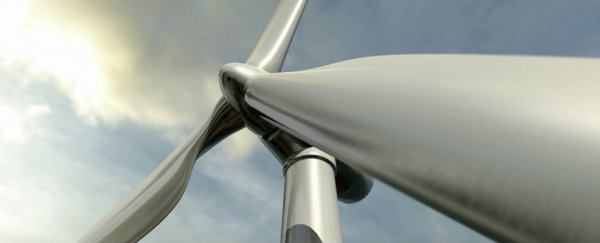While other technologies are getting smaller and smaller with each passing day, wind turbines are going in the opposite direction, because in order for them to make enough power, they need to harness more wind. Following this logic, researchers are taking turbines to a seemingly impossible scale by giving them blades that are 200 metres (656 feet) long.
As Rob Nikolewski reports for the LA Times, the new turbine will reach 479 metres (1,574 feet) into the sky - a height that's 30 metres (100 feet) taller than the Empire State Building. To keep it stable, the structure would have a diameter of roughly 400 metres (1,312) feet. This is the type of stuff that Don Quixote has nightmares about.
According to the team, the size of the turbine isn't the only thing that separates their design from past models. One of the biggest differences is that this new turbine wouldn't face the wind. Instead, it would face downwind to allow easier flow. Which makes total sense - why fight against the energy you're harvesting?
The 200-metre blades, which are almost too large to conceive of, would have segments that can spread out in light wind and tighten up in strong winds.
Besides collecting more wind at all times, the segmented design, dubbed Segmented Ultralight Morphing Rotors, makes building and transporting the blades way easier than single-framed blades. Imagine trying to transport a blade that's roughly two football fields long - not an easy task.
If everything goes the way they plan, the turbine could generate up to 50 megawatts of electricity - 25 times more energy than a traditional wind turbine.
The team is currently working to produce a 1/10th scale version of their turbine, which they hope to have ready for testing by 2019. After that, they claim it will still take roughly 15 years or so to make a full-scale version. So far, the US Energy Department has given US$3.5 million to the project - a price tag that will be sure to rise as research continues.
Though the project is super-ambitious and will require a lot of research to pull off, some are already pointing out an obvious downside to having such a giant, tall turbine: it's a bird murdering machine.
If the turbine does reach some 479 metres into the sky, it can pose a direct threat to migratory birds that wouldn't stand a change if hit by one of the blades. To overcome this, the team hopes to construct their turbine off the coast of California, where it's less likely to harm our avian friends. However, it remains unclear if that actually solves the problem, or just makes it harder to assess how many birds are affected by it.
Questions like these are vital for us to ponder as we search for better ways to power our society. Only time will tell if the team's new turbine will push us into a cleaner future, but it's definitely an ambitious, hopeful step forward.
